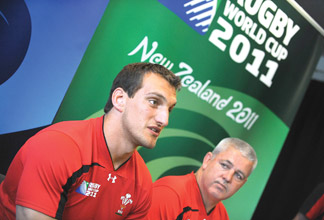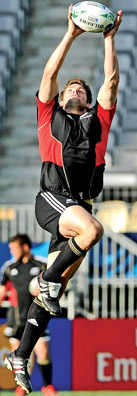All Blacks ready for World Cup opener
World Cup organizers expressed confidence the tournament would be a
spectacular success as hosts New Zealand unveiled their starting XV for
the first game against Tonga.
International Rugby Board chief Bernard Lapasset said the stage was
set for "an exceptional World Cup", which will start with a glittering
ceremony at Auckland's Eden Park before the All Blacks and Tonga play on
Friday.
|

Wales captain Sam Warburton (L) and coach Warren Gatland (R)
attend a press conference in preparation for the 2011 Rugby
World Cup in Wellington on September 9, 2011. AFP |
"New Zealanders and 95,000 fans from all corners of the earth will
join in celebration of a tournament that will deliver not just a
sporting spectacle, but a festival that will showcase alI all that is
great about this passionate rugby nation," the Frenchman said.
"New Zealand is ready. The teams are ready. The fans are ready. I
have no doubt that this will be a Rugby World Cup that New Zealanders
and the global rugby family will be proud of."
Echoing Lapasset's commments, chief organiser Martin Snedden said
although some 1,000 tickets were still available for the opener at
60,000-capacity Eden Park, sales were still on course to match
forecasts.
He said New Zealand was ready to throw off its problems of the past
year, including February's Christchurch earthquake disaster, a mining
accident which killed 29 last November and a moribund economy.
The six previous World Cups
1987 - Australia and New Zealand
The first World Cup was held in the southern hemisphere with
Australia and New Zealand co-hosting. Seven of the 16 places were filled
by the traditional world powers while invitations went out to nine
others. The group stages were predictably one-sided.
Australia were the favourites with New Zealand and France expected to
provide the stiffest opposition, and so it proved. The semi-final
between the Australians and the French was the match of the tournament
and is still regarded as a classic with Serge Blanco's late wonder try
ensuring a northern hemisphere representation in the final.
|

New Zealand All black captain Richie McCaw will be looking
forward to get the home advantage. AFP |
The French were no match for Brian Lochore's All Blacks, however,
going down 9-29 as the Kiwis won the World Cup for the first and until
this day only time.
Winners - New Zealand
1991 - England (with games also in Ireland, Scotland, Wales and
France)
The quarter-finalists from 1987 were joined by eight teams who made
it through regional qualifying. This time the All Blacks started
favourites, but they were to be upstaged by the Australians.
In the group stages there was a major upset with Western Samoa's
16-13 win over Wales in Cardiff which sent the Pacific Islanders into
the last eight along with Canada, who ousted Fiji.
The David Campese-inspired Wallabies nearly fell to Ireland in Dublin
in the quarter-finals, but they survived and comfortably defeated the
All Blacks in the semi-finals.
England ousted Scotland at the same stage, but they were out-thought
and outplayed by the Australians 6-12 in a disappointing final at
Twickenham.
Winners - Australia
1995 - South Africa
With apartheid at an end, South Africa was back in the fold of
international sport and what became known as the Rainbow World Cup was a
powerful political statement. Again 16 teams were involved and again
Wales failed to make it to the quarter-finals after a heart-breaking
24-23 loss to Ireland.
There was no question who was the star of the tournament. Giant All
Black winger Jonah Lomu was an attacking force like nothing seen before
in rugby union. His four tries against shell-shocked England in the
semi-finals remains one of the most outstanding individual
accomplishments in the history of the World Cup.
But even Lomu could not turn back the Springboks' tide in the final
as Francois Pienaar's side won 15-12 in extra-time in front of a
rapturous crowd in Johannesburg.
The skipper received the Webb Ellis Cup from the hands of President
Nelson Mandela clad in Springbok green. There were bitter accusations
later that the Kiwis had been subject to a food-poisoning plot in their
hotel on the eve of the final.
Winners - South Africa
1999 - Wales (with games also in England, France, Scotland and
Ireland)
The tournament was expanded from 16 to 20 teams split into five
groups of four countries, which necessitated a play-off format involving
the five runners-up and best third-placed side to make up the
quarter-finals.
With centre Tim Horan to the fore, Australia went from strength to
strength extinguishing the Welsh fire in front of a charged-up
Millennium Stadium in Cardiff.
But the All Blacks were still the hot favourites until they came to
grief in a classic semi-final at Twickenham against France. The French
had looked below par in their previous games, but from the start they
took the game to the Kiwis, showing great flair and invention as they
turned around a 10-24 deficit to win 43-31.
Sadly for Pierre Berbizier's men, they were unable to reproduce the
fireworks against the cool and calculating Australians in the final.
Skippered by incomparable lock John Eales, the Wallabies won 35-12 to
lift the World Cup for the second time.
Winners - Australia
2003 - Australia
This edition of the World Cup was originally awarded jointly to
Australia and New Zealand, but a dispute over stadium advertising left
the Australians to organise the tournament alone. The 20-team format was
maintained, but this time the teams were split into four groups of five
with the top two reaching the quarter-finals.
The group stages saw the usual lop-sided results with Australia
racking up a record margin 142-0 victory over Namibia. Predictably the
quarter-finals involved the old Five Nations plus New Zealand, Australia
and South Africa from the south.
Both semi-finals were knife-edge affairs, England edging
ill-disciplined France in a Sydney downpour and Australia outsmarting
the hugely fancied All Blacks thanks to Stirling Mortlock's interception
try.
The final was a thriller with Jonny Wilkinson's dramatic drop goal in
extra-time clinching the first World Cup win for England and the
northern hemisphere.
Winners - England
2007 - France (with games also in Scotland and Wales)
The latest edition retained the 20-team, four-pool format and
produced enough surprises to suggest a slight reshuffle in the old world
order. They began in the opening game when Argentina turned over the
hosts, going on to beat the fancied Irish and finish top of their group.
They later bested France again in the third-place play-off.
Georgia came within a whisker of beating Ireland, losing 12-14, while
Fiji eliminated Wales. Perennial favourites New Zealand and Australia
both cruised through the group stages - the All Blacks racking up a
century against Portugal, the only amateur side - before stumbling in
the quarter-finals to France and England respectively.
France had beaten the English for the tournament's hosting rights,
but the boot was on the other foot in the semis as England won 14-9.
In the final at Stade de France in Paris the holders met South
Africa, who had humiliated them 36-0 in the group stages. England's Mark
Cueto had a try ruled out - debate still rages about whether his toe
scuffed the touchline or not - and the boots of Francois Steyn and Percy
Montgomery gave the Springboks their second World Cup triumph.
Winners - South Africa
Most overall wins: Australia 2 (1991, 1999), South Africa 2 (1995,
2007)
Other winners: New Zealand (1987), England (2003)
Players
Most matches: Jason Leonard (ENG) 22 (1991-2003)
Most points: Jonny Wilkinson (ENG) 249 (1999-2007)
Most tries: Jonah Lomu (NZL) 15 (1995-1999)
Most conversions: Gavin Hastings (SCO) 39 (1987-1995)
Most penalties: Jonny Wilkinson (ENG) 53 (1999-2007)
Most drop-goals: Jonny Wilkinson (ENG) 13 (1999-2007)
For one single World Cup
Most points: Grant Fox (NZL) 126 in 1987
Most tries: Jonah Lomu (NZL) 8 in 1999, Bryan Habana (RSA) 8 in 2007
Most conversions: Grant Fox (NZL) 30 in 1987
Most penalties: Gonzalo Quesada (ARG) 31 in 1999
Most drop-goals: Jonny Wilkinson (ENG) 8 in 2003
For one match
Most team points: 145 by New Zealand against Japan (145-17) in 1995
Record margin of victory: 142 by Australia against Namibia (142-0) in
2003
Most individual points: 45 by Simon Culhane (NZL) against Japan in
1995
Team tries: 22 by Australia against Namibia in 2003
Individual tries: 6 by Mark Ellis (NZL) against Japan in 1995
Most team penalties: 8 by Scotland and France in 1995 and by
Australia and Argentina in 1999.
Most individual penalties: 8 by Thierry Lacroix (FRA) and Gavin
Hastings (SCO) in 1995 and by Gonzalo Quesada (ARG) and Matt Burke (AUS)
in 1999
Most team conversions: 20 by New Zealand against Japan in 1995
Most individual conversions: 20 by Simon Culhane (NZL) against Japan
in 1995
Most team drop-goals: 5 by South Africa against England in 1999.
Most individual drop-goals: 5 by Jannie de Beer (RSA) against England
in 1999.
AFP |



